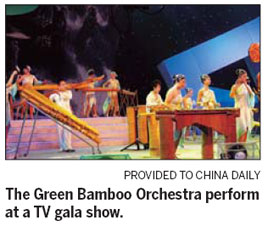
As a young woman plays a palm-sized bamboo flute, a lively chirping of birds fills the room and guides audiences into an enchanting bamboo grove filling the huge screen on stage.
Meanwhile, Wang Wei, the 62-year-old founder of the Beijing-based Green Bamboo Orchestra, swirls a meter-wide bamboo dustpan filled with beans, to reproduce the sound of raindrops on leaves.
On June 5, World Environment Day, Wang and his friends treated visitors to the CRD Theater at Shijingshan Amusement Park in Beijing to 10 unique melodies.
"Ours is the country's first green orchestra with all the music being played on bamboo instruments," Wang tells his audience.
Sunday's performance was the culmination of 20 years of efforts, he says.
It was while on a world tour in 1991 with the Oriental Song and Dance Ensemble as bassist, that Wang became fascinated by the shakuhachi, a kind of Japanese flute.
The versatile musician discovered that shakuhachi was called chi ba in Chinese and introduced to Japan during the Tang Dynasty (AD 618-907).
Among the 90 wind instruments identified by the Chinese Music Dictionary, 47 are made of bamboo.
The nation boasts more than 500 kinds of bamboo distributed over 5.2 million hectares, making it the world's biggest home of bamboo, Wang says.
Bamboo is among the fastest growing plants on Earth, gaining 1.2 meters every day under appropriate conditions.
The State Forestry Administration has been trying to replace the use of wood with bamboo to protect the environment.
One day in 2000, Wang stood in his small apartment in Beijing stuffed to the roof with various bamboo instruments. He had trawled the length and breadth of the country looking for the most appropriate kind of bamboo, that would not crack in the dry winter of northern China.
His eyes gleamed as he envisioned a band whose members dressed in ancient costumes and would play Chinese music.
"I've finally put such an orchestra in shape," Wang says, as he puts the more than 30 kinds of bamboo instruments back inside huge trunks after the Sunday show.
The smallest of them is the 4.6-cm-long oral flute, while the biggest is 3.3 meters long and weighs 6 kg.
Helping him is Chen Wei, 40, who has written and adapted more than 30 melodies for bamboo instruments since 1995.
"It's like cooking dishes," says Chen, a percussionist with the Oriental Song and Dance Ensemble. "I try to pick the most suitable elements for bamboo instruments, whose sound is mild and not explosive."
Pizzicato Polka by Johann Strauss, for example, gets a delightful makeover as Chen and several women musicians clap their hands in front of the klong put, a traditional Vietnamese instrument made of bamboo pipes of varying lengths.
Chen recalls that while trying to adapt this world-famous piece, he had to constantly dip his numbed hands in a bucket of water to revive them.
"We struggled to find the best way to clap our hands to generate a strong gust of air without too loud a clapping," Chen says. "Bamboo music is a new genre, and allows us ample space to grow."
Most of the orchestra's 15 members have at least a master's degree in music. Together they've released five CDs.
The Green Bamboo Orchestra will perform at 2 pm on Saturday (July 10) at the Forbidden City Concert Hall.

















